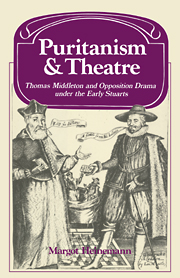Book contents
- Frontmatter
- Contents
- Introductory note
- 1 Time and Place
- 2 Puritanism, Censorship and Opposition to the Theatre
- 3 Middleton as Satirical Journalist
- 4 Early Satirical Comedies
- 5 How Anti-Puritan are Middleton's City Comedies?
- 6 Money and Morals in Middleton's City Comedies
- 7 Middle Years: Tragi-comedy and Moral Comedy
- 8 City Employments
- 9 Hard Times and Hengist, King of Kent
- 10 Political Satire: A Game at Chess
- 11 City Tragedy
- 12 Drama and Opposition, 1619–1640
- 13 From Popular Drama to Leveller Style: a Postscript
- Appendices
- Index
10 - Political Satire: A Game at Chess
Published online by Cambridge University Press: 03 November 2009
- Frontmatter
- Contents
- Introductory note
- 1 Time and Place
- 2 Puritanism, Censorship and Opposition to the Theatre
- 3 Middleton as Satirical Journalist
- 4 Early Satirical Comedies
- 5 How Anti-Puritan are Middleton's City Comedies?
- 6 Money and Morals in Middleton's City Comedies
- 7 Middle Years: Tragi-comedy and Moral Comedy
- 8 City Employments
- 9 Hard Times and Hengist, King of Kent
- 10 Political Satire: A Game at Chess
- 11 City Tragedy
- 12 Drama and Opposition, 1619–1640
- 13 From Popular Drama to Leveller Style: a Postscript
- Appendices
- Index
Summary
A Game at Chess, the anti-Spanish and anti-Catholic satirical play staged by the King's Men at the Globe in 1624, is unique not only in Middleton's work, but in the whole of early Stuart drama. Nowhere else was the popular stage used for sophisticated critical satire on matters of intense political controversy. In ordinary times a piece like this could not have been shown at all: but then 1624 was no ordinary year. The play proved the greatest box-office success of the whole period, playing for an unprecedented run of nine days to packed houses before the King got to hear about it from the complaints of foreign ambassadors and had it closed down. Moreover it attracted an extraordinarily wide audience, including many whom we ordinarily think of as hostile on principle to the public theatres. ‘There were more than three thousand persons there on the day that the audience was smallest’, wrote the indignant Spanish Ambassador Coloma to the King. ‘There was such merriment, hubbub and applause that even if I had been many leagues away it would not be possible for me not to have taken notice of it.’ And John Chamberlain wrote to Dudley Carleton that the play was frequented by all sorts of people old and young, rich and poor, masters and servants, papists and puritans, wise men etc., churchmen and statesmen. Among those who saw the play, he named Sir Henry Wotton, Sir Albert Morton, Sir Benjamin Rudyerd, ‘and a world beside’, so that evidently a number of distinguished people who normally patronised the fashionable private theatres north of the Thames took the trouble to cross the water to see it.
- Type
- Chapter
- Information
- Puritanism and Theatre , pp. 151 - 171Publisher: Cambridge University PressPrint publication year: 1980



